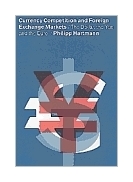|
||
• wydawnictwa polskie
• Zamów informacje o nowościach z wybranego tematu • kontakt
• Cookies na stronie |
CURRENCY COMPETITION AND FOREIGN EXCHANGE MARKETS. DOLLAR, YEN, EURO.HARTMANN P.wydawnictwo: CAMBRIDGE , rok wydania 1998, wydanie Icena netto: December 1998 | Hardback | 216 pages 22 tables 13 graphs | In stock Currency Competition and Foreign Exchange Markets by Philipp Hartmann of the European Central Bank is a major new theoretical and empirical study of international currencies, which focuses on the role which the Euro (the future European currency), will play in the international monetary and financial system along with the US dollar and the Japanese yen. In contrast to much of the existing literature which approaches the subject from a macroeconomic perspective, Philipp Hartmann develops a theoretical model which uses game theory, time series and panel econometrics, and links financial markets analysis with transaction cost economics. The results of Currency Competition and Foreign Exchange Markets are presented with reference to political, historical and institutional considerations, and provide accessible answers to policy-makers, business people and scholars world-wide. The sections on Spread Estimation and Multiple Vehicles with Inter-Dealer Price and Entry Competition will be of particular use for finance professionals. Reviews'The emergence of the Euro is the most significant monetary event of the current era. Its international role will be of key importance. In this topical and valuable book, Philipp Hartmann provides an analysis of the role and evolution of the international use of money, for example as a vehicle currency, and then applies such analysis to examine the future role of the euro, notably in relation to the US dollar. This book is both of high academic quality and of practical relevance for the light that it throws on future international monetary issues in general, and on the euro in particular.' Charles Goodhart, London School of Economics and Political Science, and member of the Bank of England Monetary Policy Committee 'An interesting and innovative study on a very important and topical issue in international finance, the theory of international currencies. It has the potential to become standard reading in international finance in the future. One of the attractions of this book is the combination of theory, empirical evidence, and historical account.....Hartmann has a great way of explaining difficult concepts in an accessible manner without putting his readers to sleep...essential for professionals.' Jurgen von Hagen, University of Bonn and Zentrum fur Europaische Intergrationsforschung '[Hartmann's] book stands out for its broad scope and unusual blend of theory, historical and institutional account of financial markets, and empirical evidence. ... Overall, Hartmann has written an interesting and innovative study with relevance to both academics and practitioners. ... Hartmann's conclusions about the relatively slow pace with which the euro will advance in international financial markets appear to be based on a sound analysis of the trends and characteristics of the different market segments. His observation that the disappearance of intra-European forex transactions by definition will exert a downward influence on the euro's market share initially, is worth stressing. In this respect, Hartmann provides a welcome and needed counterweight to existing overly optimistic forecasts of an increased role of the euro internationally together with an immediate euro appreciation.' De Economist ContentsIntroduction; 1. The importance of currency internationalization and European monetary union; 2. The pivotal role of Foreign Exchange markets; 3. Overview: 1. National and international money - a survey; 1.1. Functions of international money; 1.2. Theories of international money; 1.3. Brief history of international money; 2. A theory of vehicle currencies; 2.1. Introduction; 2.2. Transaction costs in the Foreign Exchange market; 2.3. Structures of currency exchange; 2.4. Conclusions; Appendix; 3. Currency competition between the Euro, the Dollar and the Yen; 3.1. Introduction; 3.2. The emergence of the Deutsche Mark as a Forex Vehicle currency and the 'simple arithmetics' of EMU; 3.3. EMU and Foreign Exchange Markets; 3.4. EMU and foreign trade invoicing; 3.5. EMU and official reserve holdings; 3.6. EMU, international investment and the evolution of European financial markets; 3.7. Conclusions; Appendix; Tables; 4. Trading volumes and transaction costs- from the short run to the long run; 4.1. Introduction; 4.2. Spread theory refined; 4.3. A survey of spread Estimations; 4.4. Spreads and volumes in the short run- a time series approach; 4.5. Spreads and volumes in the long run- a panel data; 4.6. Conclusions; Tables; 5. General conclusions; 5.1. International monetary and financial policies; 5.2. Theory of International money; 5.3. Foreign Exchange market micro-structure analysis; Bibliography. Księgarnia nie działa. Nie odpowiadamy na pytania i nie realizujemy zamówien. Do odwolania !. |


